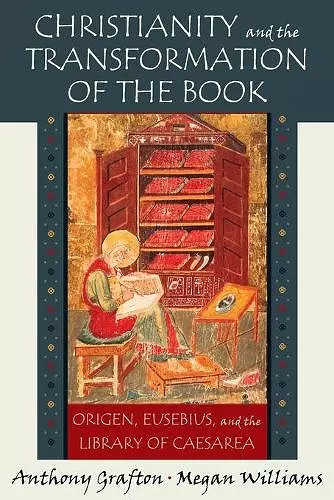Christianity and the Transformation of the Book
Origen, Eusebius, and the Library of Caesarea
Anthony Grafton author Megan Williams author
Format:Paperback
Publisher:Harvard University Press
Published:14th Jan '09
Should be back in stock very soon

There's an uncanny seventeen-hundred-year time mirror nested at the core of this marvelous little volume, as Williams and Grafton, luminous and deft as ever, burrow deeper and deeper toward the genuine bibliographic and scholarly ethos of Origen and Eusebius and assorted other Early Church Fathers, discovering there--lo and behold!--masters of mindbendingly scrupulous, if at times decidedly quirky, erudition. Nos peres, nos semblables! -- Lawrence Weschler, Director, New York Institute for the Humanities at NYU and author of Everything that Rises: A Book of Convergences
This book uses broad synthesis and close textual analysis to reconstruct the kinds of books and the ways of organizing scholarly inquiry and collaboration among the Christians of Caesarea in Roman Palestine. It explores the dialectic between intellectual history and history of the book and expands our understanding of early Christian scholarship.
When early Christians began to study the Bible, and to write their own history and that of the Jews whom they claimed to supersede, they used scholarly methods invented by the librarians and literary critics of Hellenistic Alexandria. But Origen and Eusebius, two scholars of late Roman Caesarea, did far more. Both produced new kinds of books, in which parallel columns made possible critical comparisons previously unenvisioned, whether between biblical texts or between national histories. Eusebius went even farther, creating new research tools, new forms of history and polemic, and a new kind of library to support both research and book production.
Christianity and the Transformation of the Book combines broad-gauged synthesis and close textual analysis to reconstruct the kinds of books and the ways of organizing scholarly inquiry and collaboration among the Christians of Caesarea, on the coast of Roman Palestine. The book explores the dialectical relationship between intellectual history and the history of the book, even as it expands our understanding of early Christian scholarship. Christianity and the Transformation of the Book attends to the social, religious, intellectual, and institutional contexts within which Origen and Eusebius worked, as well as the details of their scholarly practices--practices that, the authors argue, continued to define major sectors of Christian learning for almost two millennia and are, in many ways, still with us today.,
Christianity and the Transformation of the Book is a highly enjoyable and successful collaboration between a distinguished senior scholar and a very bright young historian. Drawing on a wealth of recent writing on the cultural setting of early Christianity (much of it inspired by the seminal work of Peter Brown), Grafton and Williams bring their own distinctive insistence on the centrality of innovations in book production and book distribution to the formation of momentous new patterns of thought… The book succeeds in placing Origen and Eusebius firmly and illuminatingly against a world in which Christianity had not yet triumphed, and they convey vividly the intellectual daring involved in these pioneering attempts to articulate and define Christianity alongside and against the Jewish and the classical worldviews. In the process they provide a reminder—salutary and timely, from a European perspective, in an increasingly aggressive secularist climate—of how much Jewish and Christian thought patterns have contributed to shaping some of the most fundamental assumptions and directions of Western culture. -- Eamon Duffy * New York Review of Books *
With forays into library history, papyrology, and reception studies, this book is multi-faceted, erudite, and inspiring in its scope. -- Scott Fitzgerald Johnson * Bryn Mawr Classical Review *
A fascinating exercise in intellectual history that highlights the crucial role books played in the rise of Christianity… Thanks to the stories so ably told in this work, one realizes that scholarship in the name of truth is a very ancient calling in Christianity. -- Lawrence S. Cunningham * Commonweal *
There’s an uncanny seventeen-hundred-year time mirror nested at the core of this marvelous little volume, as Williams and Grafton, luminous and deft as ever, burrow deeper and deeper toward the genuine bibliographic and scholarly ethos of Origen and Eusebius and assorted other Early Church Fathers, discovering there—lo and behold!—masters of mind-bendingly scrupulous, if at times decidedly quirky, erudition. Nos pères, nos semblables! -- Lawrence Weschler, Director, New York Institute for the Humanities at NYU and author of Everything That Rises: A Book of Convergences
Grafton and Williams demonstrate how, in late antiquity, when the papyrus scroll and the codex were both being used to create books, Christian scholars Origen and Eusebius pioneered techniques such as the use of parallel columns, multiple colors, and complex tables to create new forms of scholarship that would inspire future intellectuals and in turn lead to the supremacy of the codex. In this lively and accessible volume, readers learn of the conception and execution of Origen’s Hexapla, a philological tool in six columns for studying the Hebrew Bible, and how Eusebius used his position as a Christian bishop to develop a major research center at Caesarea, where books were collected, copied, and created. Grafton and Williams argue that rather than ignoring difficult, often conflicting, non-Christian sources, Origen and Eusebius critically engaged and quoted these sources, thereby setting intellectual precedents that would be emulated by later scholars such as Jerome, Bede, and Erasmus. -- T. J. Bond * Choice *
ISBN: 9780674030480
Dimensions: unknown
Weight: unknown
384 pages